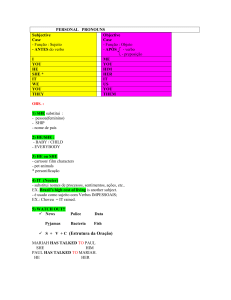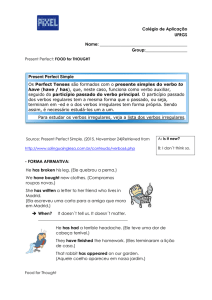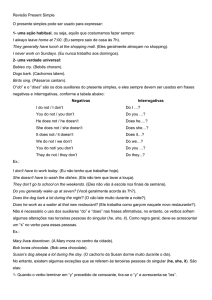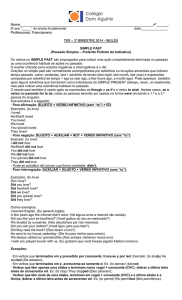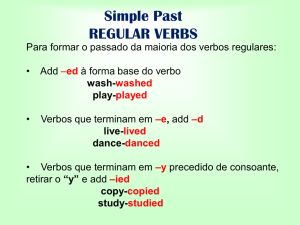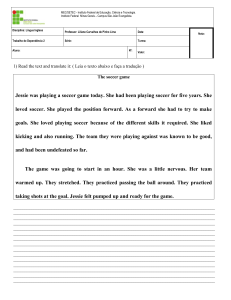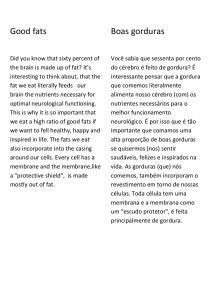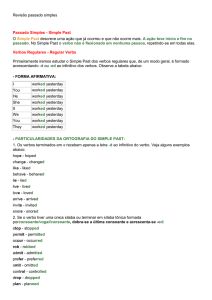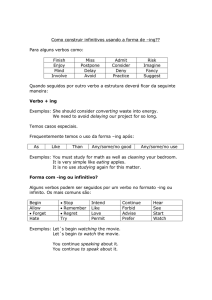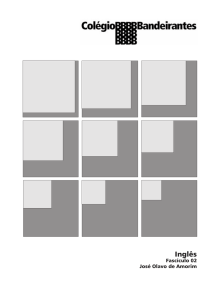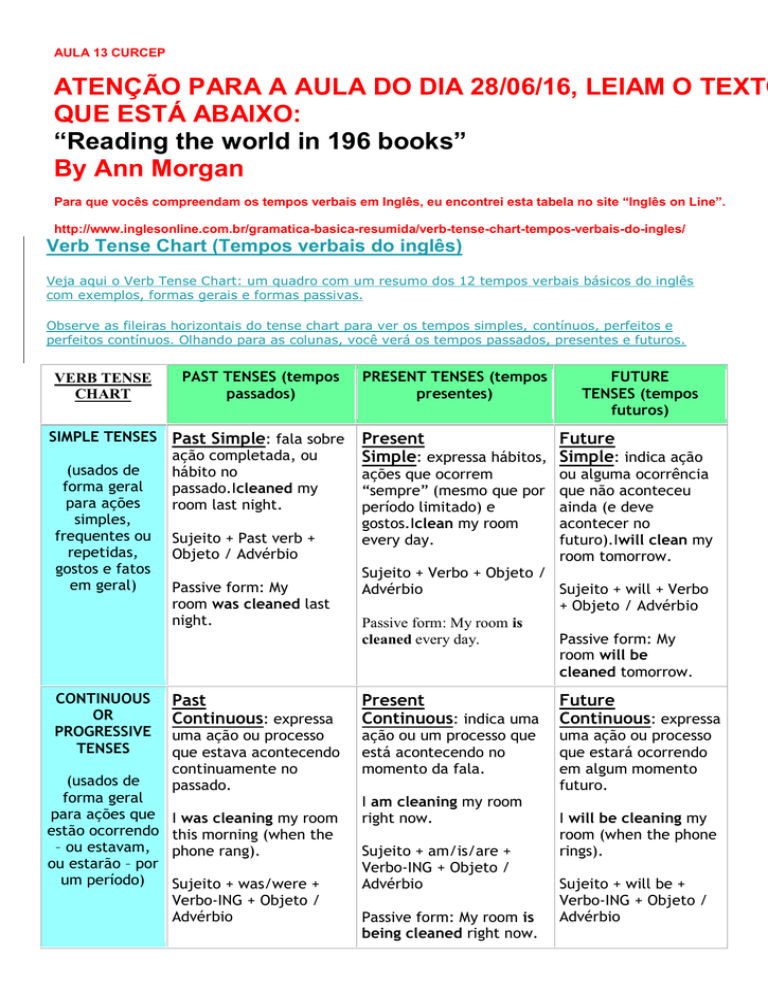
AULA 13 CURCEP
ATENÇÃO PARA A AULA DO DIA 28/06/16, LEIAM O TEXTO
QUE ESTÁ ABAIXO:
“Reading the world in 196 books”
By Ann Morgan
Para que vocês compreendam os tempos verbais em Inglês, eu encontrei esta tabela no site “Inglês on Line”.
http://www.inglesonline.com.br/gramatica-basica-resumida/verb-tense-chart-tempos-verbais-do-ingles/
Verb Tense Chart (Tempos verbais do inglês)
Veja aqui o Verb Tense Chart: um quadro com um resumo dos 12 tempos verbais básicos do inglês
com exemplos, formas gerais e formas passivas.
Observe as fileiras horizontais do tense chart para ver os tempos simples, contínuos, perfeitos e
perfeitos contínuos. Olhando para as colunas, você verá os tempos passados, presentes e futuros.
VERB TENSE
CHART
PAST TENSES (tempos
passados)
SIMPLE TENSES Past Simple: fala sobre
ação completada, ou
(usados de
hábito no
forma geral
passado.Icleaned my
para ações
room last night.
simples,
frequentes ou Sujeito + Past verb +
repetidas,
Objeto / Advérbio
gostos e fatos
em geral)
Passive form: My
room was cleaned last
night.
CONTINUOUS
OR
PROGRESSIVE
TENSES
(usados de
forma geral
para ações que
estão ocorrendo
– ou estavam,
ou estarão – por
um período)
Past
Continuous: expressa
uma ação ou processo
que estava acontecendo
continuamente no
passado.
I was cleaning my room
this morning (when the
phone rang).
Sujeito + was/were +
Verbo-ING + Objeto /
Advérbio
PRESENT TENSES (tempos
presentes)
FUTURE
TENSES (tempos
futuros)
Present
Future
Simple: expressa hábitos, Simple: indica ação
ações que ocorrem
“sempre” (mesmo que por
período limitado) e
gostos.Iclean my room
every day.
ou alguma ocorrência
que não aconteceu
ainda (e deve
acontecer no
futuro).Iwill clean my
room tomorrow.
Sujeito + Verbo + Objeto /
Advérbio
Sujeito + will + Verbo
+ Objeto / Advérbio
Passive form: My room is
Passive form: My
cleaned every day.
room will be
cleaned tomorrow.
Present
Continuous: indica uma
ação ou um processo que
está acontecendo no
momento da fala.
I am cleaning my room
right now.
Sujeito + am/is/are +
Verbo-ING + Objeto /
Advérbio
Passive form: My room is
being cleaned right now.
Future
Continuous: expressa
uma ação ou processo
que estará ocorrendo
em algum momento
futuro.
I will be cleaning my
room (when the phone
rings).
Sujeito + will be +
Verbo-ING + Objeto /
Advérbio
VERB TENSE
CHART
PAST TENSES (tempos
passados)
PRESENT TENSES (tempos
presentes)
Passive form: My
room was being
cleaned this morning
(when the phone rang).
PERFECT
TENSES
(usados de
forma geral
para comunicar
uma ação que
terminou – ou
tinha
terminado, ou
terá terminado
– antes de um
momento
específico)
PERFECT
CONTINUOUS
OR
PROGRESSIVE
TENSES
(usados para
ações contínuas
que terminaram
– ou tinham
terminado, ou
terão terminado
– antes de um
momento
específico)
Past Perfect: fala de
uma ação que foi
completada em um
momento passado, antes
de outra ação ocorrer.
FUTURE
TENSES (tempos
futuros)
Passive form: (não se
usa para este tense e
exemplo específicos)
Present
Perfect: expressa ação
Future
Perfect: indica ação
que ocorreu no passado
em momento indefinido,
ou ação que começou no
passado e ainda continua
I had already cleaned my até o momento.
room (when the phone
rang).
I have already cleaned my
room.
Sujeito + had + Advérbio
+ particípio do Verbo
Sujeito + have/has +
particípio do Verbo +
Passive form: My
Objeto
room had already been
cleaned (when the
Passive form: My
phone rang)
room has alreadybeen
cleaned.
que terá sido
completada antes de
uma outra ação
ocorrer.
Past Perfect
Continuous: fala de
Present Perfect
Continuous:indica uma
Future Perfect
Continuous:fala de
uma ação no passado que
começou antes de um
certo momento e
continuou até aquele
momento.
ação que começou em
algum ponto do passado e
é contínua ou repetida, e
pode ou não já ter sido
completada.
uma ação que terá
acontecido por algum
tempo e ainda não
estará completa em
um certo momento
futuro.
I had been cleaning my
room for an hour when
the phone rang.
I have been cleaning my
room for an hour.
Sujeito + had been +
Verbo-ING + Objeto
Sujeito + have/has been +
Verbo-ING + Objeto
I will have cleaned my
room by the time the
phone rings.
Sujeito + will have +
particípio do Verbo +
Objeto
Passive form: My
room will have been
cleaned by the time
the phone rings.
I will have been
cleaning my room for
an hour when the
phone rings.
Passive form: (não se usa Sujeito + will have
Passive form: (não se usa para este tense e exemplo been + Verbo-ING +
para este tense e
específicos)
Objeto
exemplo específicos)
Passive form: (não se
usa para este tense e
exemplo específicos)
Agora que vocês tiveram uma noção geral dos tempos verbais em Inglês, vamos nos concentrar
em apenas um deles.
Para estudar mais é só entrar em: http://www.solinguainglesa.com.br/conteudo/Verbos11.php
Past Perfect
O Past Perfect é usado para descrever uma ação que ocorreu no passado, antes de outra ação também
passada. Observe as formas e os usos deste tempo verbal:
FORMAS:
O Past Perfect é formado com o passado simples do verbo to have (had), que funciona como auxiliar do verbo
principal, seguido do past participle (particípio passado) do verbo principal. Lembre-se de que o particípio passado
dos verbos regulares terminam em -ed e os verbos irregulares possuem forma própria (ver verbos irregulares). Observe
as formas desse tempo verbal:
- FORMA AFIRMATIVA:
The film had already started when we got to the cinema.
(O filme já tinha começado quando chegamos ao cinema.)
Compare: The film started when we got to the cinema - As duas ações ocorreram ao mesmo tempo, diferente do que
ocorre no Past Perfect, onde ambas ações ocorrem no passado, porém uma antes da outra.
The mall had already closed when I arrived there. (O shopping já tinha fechado quando cheguei lá.)
AFFIRMATIVE FORM: SUJEITO + PASSADO SIMPLES DO VERBO TO HAVE (HAD) +
PARTICÍPIO PASSADO DO VERBO PRINCIPAL
- FORMA NEGATIVA:
A Forma Negativa do Past Perfect forma-se acrescentando not ao verbo auxiliar, que é o passado simples do verbo to
have (had).
* FORMA CONTRAÍDA: HAD + NOT = HADN'T
The couch got soaked because they had not closed the window while it was raining.
(O sofá ficou encharcado porque eles não tinham fechado a janela enquanto estava chovendo.)
I hadn't heard you knocking the door because I was sleeping.
(Não ouvi você bater na porta porque estava dormindo.)
Peter hadn't realized that the place was so dangerous.
(Pedro não tinha se dado conta de que o lugar era tão perigoso.)
NEGATIVE FORM: SUJEITO + HAD + NOT (HADN'T) + PARTICÍPIO PASSADO DO VERBO
PRINCIPAL
- FORMA INTERROGATIVA:
Na Forma Interrogativa do Past Perfect, o verbo had posiciona-se antes do sujeito da oração:
Had the train already left when you got to the station?
(O trem já tinha partido quando você chegou à estação?)
Had you already had dinnner when I called to you?
(Você já tinha jantado quando eu liguei?)
Had she read the book before seeing the movie?
(Ela tinha lido o livro antes de assistir ao filme?)
INTERROGATIVE FORM: HAD + SUJEITO + PARTICÍPIO PASSADO DO
VERBO PRINCIPAL
No vestibular e no ENEM, como vocês já sabem, vai ter interpretação de texto, portanto, vamos analisar a prova
do vestibular da UFPR/2014.
Reading the world in 196 books
By Ann Morgan (Photo: Darren Russell) – BBC - 15 July
2013 Writer Ann
Morgan set herself a challenge – to read a book from every
country in the world in one year. She describes the experience and
what she learned.
I used to think of myself as a fairly cosmopolitan sort of person, but my bookshelves told a different story. Apart from a few Indian
novels and the odd Australian and South African book, my literature collection consisted of British and American titles. Worse still, I
hardly ever tackled anything in translation. My reading was confined to stories by English-speaking authors.
So, at the start of 2012, I set myself the challenge of trying to read a book from every country (well, all 195 United Nations (UN)
recognised states plus former UN member Taiwan) in a year to find out what I was missing. With no idea how to go about this
beyond a sneaking suspicion that I was unlikely to find publications from nearly 200 nations on the shelves of my local bookshop, I
decided to ask the planet’s readers for help. I created a blog called A Year of Reading the World and put out an appeal for
suggestions of titles that I could read in English. The response was amazing. Before I knew it, people all over the planet were
getting in touch with ideas and offers of help. Some posted me books from their home countries. Others did hours of research on
my behalf. In addition, several writers, like Turkmenistan’s Ak Welsapar and Panama’s Juan David Morgan, sent me unpublished
translations of their novels, giving me a rare opportunity to read works otherwise unavailable to the 62% of Brits who only speak
English. Even with such an extraordinary team of bibliophiles behind me, however, sourcing books was no easy task. For a start,
with translations making up only around 4.5 per cent of literary works published in the UK and Ireland, getting English versions of
stories was tricky.
But the effort was worth it. As I made my way through the planet’s literary landscapes, extraordinary things started to happen. In the
hands of gifted writers, I discovered bookpacking offered something a physical traveller could hope to experience only rarely: it took
me inside the thoughts of individuals living far away and showed me the world through their eyes. More powerful than a thousand
news reports, these stories not only opened my mind to the nuts and bolts of life in other places, but opened my heart to the way
people there might feel.
And that in turn changed my thinking. Through reading the stories shared with me by bookish strangers around the globe, I realised
I was not an isolated person, but part of a network that stretched all over the planet. One by one, the country names on the list that
had begun as an intellectual exercise at the start of the year transformed into vital, vibrant places filled with laughter, love, anger,
hope and fear. Lands that had once seemed exotic and remote became close and familiar to me – places I could identify with. At its
best, I learned, fiction makes the world real.
(adapted from <http://www.bbc.com/culture/story/20130715-reading-the-world-in-365-days>)
73 - According to the text, before her experience with the blog the author used to think of herself as a cosmopolitan
person. However, she realised that:
a) she needed to buy bookshelves for her new collection of books.
b) her literature collection consisted mostly of Indian novels.
►c) her reading was limited to books originally written in English.
d) she had read a lot of books translated to the English language.
e) her favourite authors were mostly Indian, Australian and South African.
74 - Identify the statements below about Ann Morgan as true (T) or false (F), according to the text.
( ) She decided to read nearly 200 books in a year, which included all the UN-recognized countries.
( ) She was sure she could find all the books she wanted to read at the local bookstore.
( ) She felt that she was missing something by not having read foreign publications.
( ) She created a blog to ask for suggestions of books she could read in English.
( ) She decided not to read a book from Taiwan because it was a former UN member.
Mark the alternative which presents the correct sequence, from top to bottom.
a) F – T – F – T – F.
b) T – F – T – F – T.
c) T – T – F – F – T.
d) F – F – F – T – T.
►e) T – F – T – T – F.
75 - Consider the following statements about the blog “A Year of Reading the World” and people’s reaction to it.
1. The blog was very successful in getting responses from people all over the world.
2. Some people posted books from their countries to Ann while others did hours of research.
3. Some writers sent her translations of their novels that had already been published in English.
4. Sixty-two per cent of the people that visited the blog and gave suggestions to Ann were British.
5. The blog made it quite easy for Ann Morgan to find books from all over the world.
Which of the statements above are TRUE, according to the text?
a) Only 1, 3 and 5.
b) Only 3 and 4.
c) Only 2, 3 and 5.
►d) Only 1 and 2.

